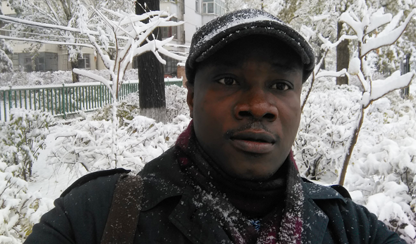11 November 2020
Institute news
 We’d like to introduce you to a PhD student in our Physical Activity laboratory, Francis Dzakpasu. Francis grew up in a small district town, Dzodze, in the Volta region of Ghana. Since then he’s travelled around the world studying and working as a doctor. Francis, who first came to Australia to study in 2017, is now ready to take the next step in a medical research career, joining the Institute last year.
We’d like to introduce you to a PhD student in our Physical Activity laboratory, Francis Dzakpasu. Francis grew up in a small district town, Dzodze, in the Volta region of Ghana. Since then he’s travelled around the world studying and working as a doctor. Francis, who first came to Australia to study in 2017, is now ready to take the next step in a medical research career, joining the Institute last year.
What project are you working on for your PhD?
My PhD focuses on sedentary behaviour and musculoskeletal pain disorders in type 2 diabetes. Musculoskeletal pain disorders are an emerging co-morbidity in adults with type 2 diabetes and may have a detrimental effect on type 2 diabetes management. An adequate level of physical activity is a cornerstone of glycaemic control in people with type 2 diabetes. However, those with a coexisting musculoskeletal pain disorder may find it difficult to meet the recommended level. This could contribute, in part, to a high volume of sedentary behaviour in this population, consequently worsening both the type 2 diabetes and the musculoskeletal pain disorder. The research approach is to use statistical modelling to understand the associations of sedentary behaviour with musculoskeletal pain disorders in people living with type 2 diabetes.
You’ve travelled widely for study and work, how many languages can you speak?
In Ghana, I grew up in an environment where different ethnic languages are spoken. I fluently speak two Ghanaian languages. The Ewe language is my mother dialect and is also commonly spoken in neighbouring Togo as well as Benin in West Africa. Besides that, I speak Akan, the most popular Ghanaian language. I speak English because it is the official language in Ghana and all my education in Ghana was in English. I also spent several years in China and learnt to speak Mandarin.
What is it like to be away from family and friends during the current pandemic?
This has been the most challenging time in my life. Sadly, I lost the last of my parents not too long before the pandemic started – my mother, who could not read and had little money when I was a child, but who was the biggest motivator for my education. While thankfully I don’t need to worry about my parents, I still have close family and friends around the world who I worry about. I often speak with my siblings and they are equally worried about me! It is my prayer that people will understand the nature of a global pandemic and follow the science.
Where do you see yourself in five years?
Since training as a medical doctor and working mostly in urology, my interest has shifted to scientific research. I’m now at the bottom of this learning curve and hoping to grow steadily to become an experienced medical researcher. In the next five years, I am hopeful the world will have overcome the current global pandemic, become stronger, and well prepared for other cross border diseases. I see myself contributing to that future through scientific outputs that will provide information for guidelines for preventive and curative medicine.
What would people be most surprised to learn about you?
Most people will not sleep well if there is noise or any disturbance, but I am the opposite. I only sleep well whenever there is some level of noise, such as music or radio playing in the background.
Stay on top of the latest findings with our newsletter
Subscribe




